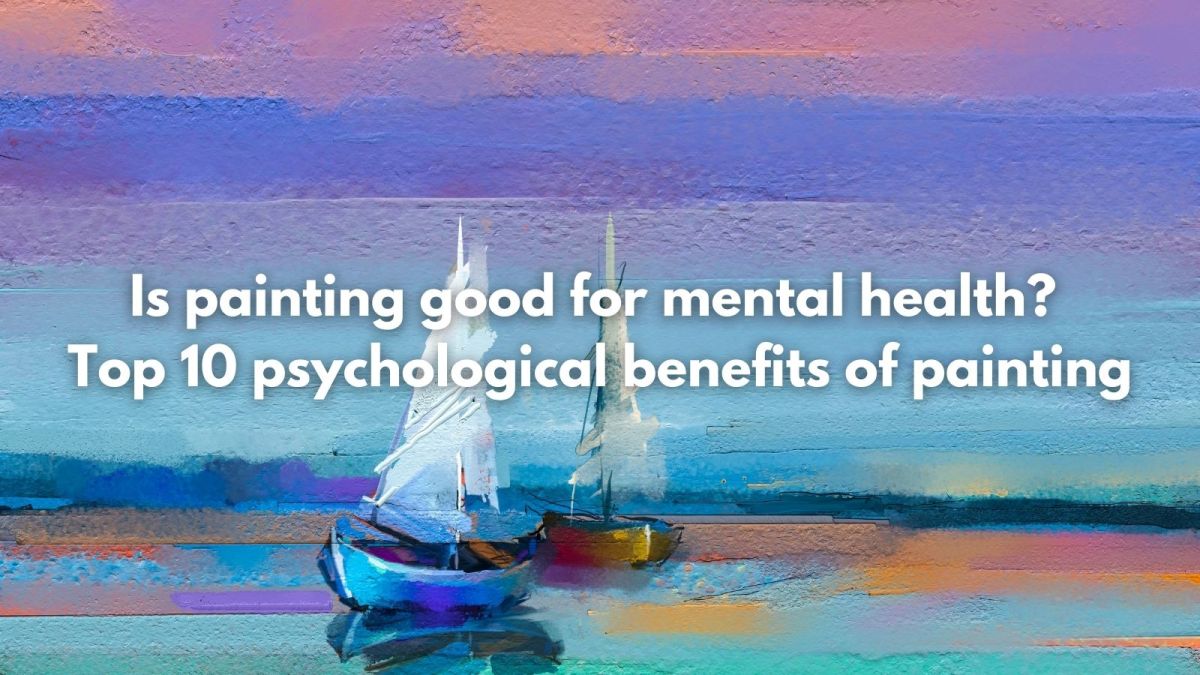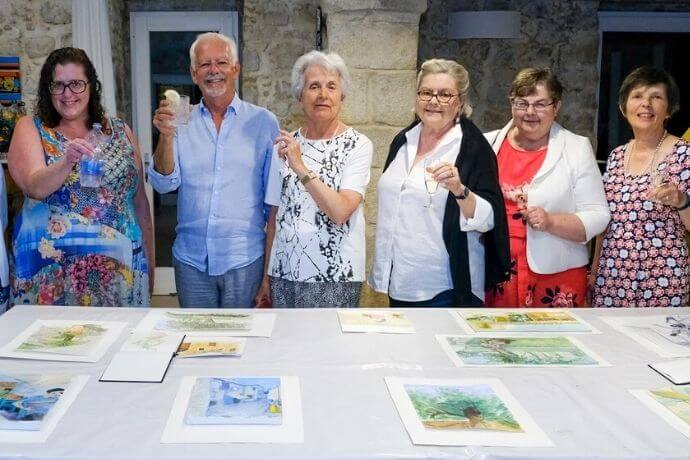
Painting is good for mental health as it can be an effective and enjoyable part of maintaining your health and wellbeing. Many of us have hobbies, whether it be a sport or creative pursuit, having a passion that’s just for you encourages personal growth and development, as well alleviating stress.
Flavours Holidays brings together the normal joys of a trip away with great food, beautiful scenery and sunshine, combined with a variety of activities to really encourage guests to invest time in themselves and forget day-to-day life.
And, it works! We’ve noticed that many people come home from our painting holidays feeling recharged and refreshed, which got us wondering about the emotional and psychological benefits of painting. We still have availability for a painting holiday in Scotland this summer!
Of course, a week in Italy exploring historic towns and clicking prosecco glasses is bound to put a spring in anyone’s step. But, could there be more to it than that – could painting in and of itself improve your mental health and emotional well-being?
Well, we’ve put our research caps on and looked into it for you. For example, one interesting study by a psychologist and neuroscientist, Kelly Lambert, suggests that painting may actually alleviate depression and anxiety by stimulating parts of the brain affected by depression. Other psychologists liken the complete concentration experienced while painting to mindfulness practises such as meditation and yoga.
Read on to explore the ways that painting can highly impacts your wellbeing. Could this be the beginning of a new creative hobby?
1. Learn to look at the world from a new perspective
We work with a selection of fantastic painting tutors on our holidays, including impressionist (and guest favourite), Mark Holden.
Mark says that one of the greatest things about tutoring our guests over the course of a week or long weekend , is helping them to re-think their technique, step away from their usual style and look at the world with a new lens.
“I worked with a woman who had been almost blind for much of her life. A few years previously she had received a life-changing operation which dramatically improved her eyesight, which was incredible for her. She’d always loved painting, but because of her vision, she had worked incredibly close-up, choosing a small part of a scene to focus on”, Mark explains.
‘Throughout our sessions I introduced her to a more impressionist style and she began painting entire landscapes, altering her perspective. It actually changed the way she viewed the world and helped her to let go of old habits that were linked to her previous disability. It was amazing to see how this creative act informed the way she looked around her now when exploring, walking and socialising.”

2. Develop your creativity
This may sound obvious enough, but what might not be obvious is that painting stimulates both the right and left side of the brain. In painting, we use the left side of the brain to tackle rational, logical challenges – how to structure the painting, for example – while the left side of the brain is used for more creative challenges, helping the painter visualise their work before they even set up their easel.
Even as a beginner, learning how to paint will strengthen your mind as you try our new techniques and master new skills! If you’re looking to start painting, or improve your current skill set, try joining an online painting class to further boost your creative spirit.
Painting is an all-brain exercise, strengthening the mind and triggering dopamine activity in the brain. You could say that indulging your creative spirit is aerobics for your brain! A perfect painting benefit to add to the list.

3. Emotional wellbeing is supported
Painting can be a cathartic experience, allowing you to access feelings buried deep within your subconscious. Painting is good for your mental health because you’re giving these feelings a physical shape on canvas, it can help you to work through them and resolve anguish or upset.
This is why psychologists often prescribe art therapy for patients who have suffered psychological trauma: it helps to release emotions in a safe, non-threatening environment.
By learning to better express yourself, through the medium of art, painting can be an act of self-care that supports your emotional wellbeing.

4. Practise being present in the moment
A criticism of the digital age is that as attention spans have got shorter, our ability to be present in the moment has dissolved. One of the brilliant things about a hobby which uses your hands is that it means putting down your phone and switching off from calls, texts, social media and the internet.
Quietening the noise of digital intrusions gives you the opportunity to really engage in honing your skills, spending time with yourself and enjoy the present moment.
Mark explains how joyful it is to watch this happening while teaching on a Flavours holiday: “Flavours guests are particularly rewarding to teach because they become so involved in what they’re doing. You see a calmness settle over the group as they begin painting and that can continue all day, they don’t get bored. It’s amazing to see a room of people become comfortably quiet and be so happily absorbed in an activity.”

5. Building your problem-solving skills
Although we try our best, sometimes our paintings rarely turn out as originally planned! Changes in the light, the limitations of your palette, and just plain old lack of experience and technique mean that, sometimes, what you start out trying to achieve sometimes doesn’t come to life the way that you expected.
Although this can be frustrating and disappointing, it turns out that this can actually be good for you! Unexpected results have two benefits: for starters, you pretty quickly learn to deal with disappointment, and in time (often through repeated error) you realise that when one door closes, another opens. You quickly learn to adapt and come up with creative solutions to the problems the painting presents, and this means that thinking outside the box becomes second nature.
Creative problem-solving skills are incredibly useful in daily life, and mean you’re more likely to be able to quickly come up with a solution when a problem arises.

6. Improve memory and concentration
Painting is like a work-out for your brain, boosting memory function and sharpening the mind. In particular, painters exercise the parts of their brain responsible for memory and concentration.
People who regularly practice creative activities such as painting are shown to have less chance of developing Alzheimer’s and dementia. So, not only is your painting hobby sparking joy, it’s also looking after your health and safeguarding your brain functions for the future.

7. Develop your communication skills
Painting is good for mental health as it taps into your subconscious and allows you to communicate your feelings to yourself and the outside world through the pieces you create. Not only this, but it acts as an ice-breaker – giving you a shared interest with thousands of other artists and art appreciators around the world!
Our painting holidays are pretty social affairs, and inevitably you end up discussing each other’s art. Little wonder that many come back from our holidays not just with a portfolio of paintings, but also an address book full of new friends.

8. Build determination and goal-setting
While painting is a wonderful pastime to practise at home, the great thing about attending an activity-based holiday is that it allows you to decide on a set goal with a measurable time frame to work through it.
Over the course of a long weekend or full week, our guests can use the help of tutors to develop new skills and earn a sense of achievement by completing a whole piece by the end of the holiday.
“Flavours Holidays is all about enjoying your break on your own terms. We always say to guests, it’s your time away – if you want to lie by the pool, lie by the pool! But honestly, it’s actually harder getting people away from their easel and out into the sunshine – they become so determined!”, says Mark.
“It’s great to see how much finishing the piece means to people and they always feel fantastic after creating something they’re really proud of.”

9. Relieves stress
Painters enter a world of their own as they create, and this allows them – albeit unconsciously – to separate themselves from the stresses and strains of everyday life. No mortgage, no office politics – just colour and shade, and ‘how on earth do I do justice to those incredible poppies and that terracotta rooftop?’, instead.
Painting allows us to escape our daily struggles, and it lifts us. By focusing on our painting, we achieve what art critic and philosopher, Arthur Danto, calls “transfiguration of the commonplace,’ as our painting becomes imbued with meanings that go well beyond their literal worth.
In other words, your painting may not turn out like you thought it would, but somehow just by contemplating it, studying it, you feel lifted by its beauty.

10. Heal the mind
You may struggle to capture the full beauty of that hilltop town or cypress-studded skyline, but just trying can have a hugely positive impact. Painting is a meditative act – it takes you out of yourself, freeing yourself from your physical limitations. This means you are only focusing on the present and on the artwork in front of you as you paint, freeing your mind from worries and intrusive thoughts.
Art can be a healing act, a balm for the soul and the mind. There’s also cases where art has helped with physical rehabilitation as well. For instance, Renoir and Gauguin are two famous examples of artists, who through painting’s transcendental bliss, were able to move atrophied hands, experiencing a remarkable temporary healing.

What painting benefit do you relate to?
As it turns out, not only is painting a generally enjoyable activity, but it’s incredibly good for your mental health and wellbeing. The 10 psychological benefits are astounding, even though you might not notice them whilst you’re painting your own masterpiece. So, now it’s time to dig out the sketchbook and paintbrushes, and embrace your creativity. Go on – painting is good for you and for your mental health!
Let us know in the comments below what painting benefit you learnt about today!








Join the Discussion